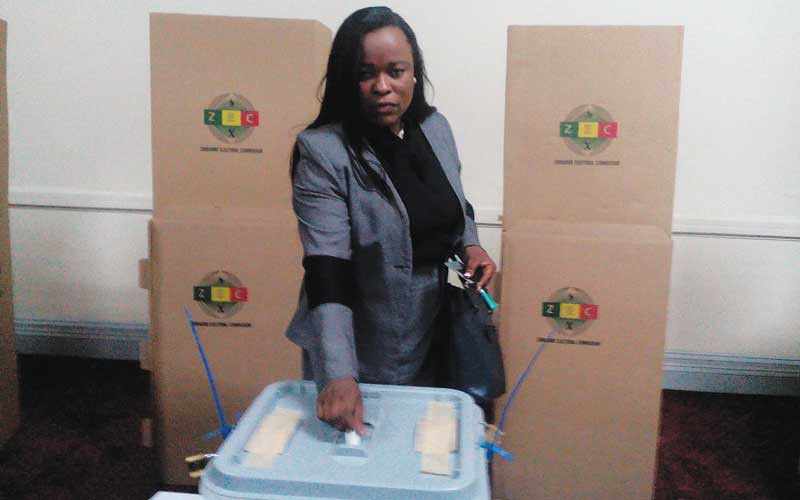
THE Election Resource Centre (ERC) on November 3, 2021 filed a complaint with Local Government, Public Works and National Housing minister July Moyo against Chiefs’ Council president Fortune Charumbira for contravening section 281 of the Constitution by participating in partisan politics for comments made on October 29, 2021 at the Zanu PF annual conference in Bindura.
In his comments, Charumbira declared that “… traditional leaders were owners of Zanu PF and rule everywhere and that’s what defines their relationship with Zanu PF, we are one people … we will never leave Zanu PF.”
The latest comments shows that Charumbira is blatantly ignoring a 2018 High Court order (Election Resource Centre v Chief Fortune Charumbira & Ors HC 1718/18) compelling him to withdraw partisan comments he made, calling on traditional leaders to support Zanu PF ahead of the 2018 harmonised elections.
The conduct of the chief, if left to fester, has the potential to destroy the rule of law and constitutional supremacy in Zimbabwe.
The Local Government minister and all electoral stakeholders must resist the temptation to exempt the conduct of Charumbira from the necessary scrutiny.
The ERC calls on the Local Government minister in terms of section 7 of the Traditional Leaders Act to investigate Charumbira’s conduct and institute disciplinary proceedings against him and ensure that the supremacy of the Constitution prevails. –ERC
Musengezi matter: Fools’ paradise
LAWYER and constitutional expert Alex Magaisa says section 98(1) does not apply in the matter between Zanu PF activist Sybeth Musengezi and President Emmerson Mnangagwa, where the former is challenging the latter’s ascendancy to power following a November 2017 military coup. Magaisa is very wrong.
- Chamisa under fire over US$120K donation
- Mavhunga puts DeMbare into Chibuku quarterfinals
- Pension funds bet on Cabora Bassa oilfields
- Councils defy govt fire tender directive
Keep Reading
Section 98(1) says, “while in office, the President is not liable to civil or criminal proceedings in any court for things done or omitted to be done in his or her personal capacity”.
May Magaisa and everyone who follows him point out a section that says a President can, however, be sued under these circumstances. Fact is there is no such provision in the Constitution.
The President cannot be sued in any court of law period.
Even if a President could be sued, this matter was long dealt with by the same court that Musengezi has approached.
Soon after the removal of the late former President Robert Mugabe and all those that surrounded him, one E Rera Sibanda approached the High Court to have the processes that led to their removal declared legal.
The High Court ruled in Rera’s favour. If Musengezi then felt Mugabe and his followers should have led the processes of removing themselves from power, he should have applied for a joinder or appealed against the High Court order then.
Fact is the High Court has no legal standing to hear this matter.
On that technicality alone, the matter will be dismissed. Mnangagwa is here to stay.
His works have proved that he is a capable leader and already has 2023 in his pocket, hence these moves to try and remove him before then. Unfortunately, with lawyers like Magaisa, it will remain wishful thinking.-O Gutu
Let’s have standalone Sexual Harassment Bill
THE Women’s Academy For Leadership and Political Excellence (Walpe) with support from Oxfam convened two breakfast meetings with parliamentarians and presented a model Sexual Harassment Bill to the portfolio committees on Women Affairs, Gender and Community Development and the committee on Public Service, Labour and Social Welfare in Harare on October 18, 2021.
The committee members shared lived experiences of sexual harassment that occur in their families, communities, political parties and various spheres of influence. Walpe emphasised the need for a standalone Sexual Harassment Bill which recognises abuses that occur in the private, public, formal and informal spaces.
The model Sexual Harassment Bill was submitted to Parliament through the committees and the MPs committed among other things to do the following:
- Move motions in Parliament pushing for a gender responsive Sexual Harassment Bill.
- Increase knowledge on sexual harassment in various public and private spheres such as the family, community, schools and political parties etc.
- Capacitate traditional and religious leaders on the effects of sexual harassment and reporting structures.
On the second day, Walpe converged with the committees from Local Government, Rural and Urban Development and, Women Affairs, Gender, Community and Enterprise Development ministries to present and discuss its model policy on unpaid care and domestic work (UCDW).
The organisation also presented its gendered social services budget proposal that prioritises health, education, water and sanitation, women empowerment, and energy which will feed into the ongoing national budget consultations accounting for 42% of the total expenditure projected for 2022 by Treasury. This budget proposal was submitted to Parliament and the Finance and Economic Development ministry for consideration.
It was agreed during the meeting that addressing critical social services would reduce the disproportionate burden of UCDW on women and girls and some of the key action plans were:
- Parliamentarians would attend the national budget seminar and also move motions in Parliament for a gender responsive national budget that prioritises social services and reducing burden of UCDW on women.
- Raising awareness in communities about the ongoing national budget consultative processes and encourage people to actively participate in outreach meetings conducted by Parliament.
- Tracking the budget once allocations are made to ensure that they benefit women and girls.
- Advocating for innovative solutions to reduce unpaid care and domestic work like use of solar energy and mechanisation of the agricultural sector. –Walpe











